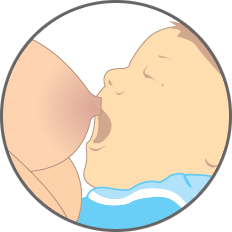Susan, who just had a baby 5 days ago, is facing a problem producing milk. She’s tried pumping her breasts but nothing seemed to work. Susan is upset as she really wants to breastfeed her baby. What is more hurtful is that this is her first child.
If you face a problem breastfeeding, like Susan, don’t give up. After all, doctors and nutritionists across the world agree that breast milk and breastfeeding are best for baby. Breast milk is a complete food which provides baby with all the energy and nutrients that he needs for his growth and development. It also contains antibodies which help to strengthen his immune system and protect him from many common childhood infections (such as diarrhoea, cough and cold).
Like any mom, you have the ability to produce milk. The process, called lactation, depends on baby’s needs and demands.
As baby suckles, your nipples are stimulated. A message is sent to your brain, which causes the production of a hormone, called prolactin, that initiates the production of milk in your breasts. The more baby suckles, the more of this hormone is released and the more milk you make. When baby suckles, oxytocin is also released into your bloodstream and, in turn, causes the milk to flow.
The first milk that you make during the 2-3 days after delivery is called colostrum. It is slightly yellowish in colour, low in fat, and high in carbohydrates, protein and antibodies to help keep baby healthy.
Common Problems In Breastfeeding
Problem 1: “My breasts are too small to produce milk!”
Don’t fret; size does not matter at all. If you have small breasts, you can still produce milk. The size of your breasts does not determine the milk production. Even small breasts can produce the same amount of milk as larger breasts.
Problem 2: “My milk flows too slowly!”
When you find that your milk is flowing too slowly, it could be due to a slow “let-down reflex”. This is the reflex that causes the milk to flow when baby begins to suck. Feeling tired or anxious actually affects this reflex and delays your milk flow. Before you start nursing baby, try to relax and rest so that you don’t feel too exhausted.
Problem 3: “My nipples are painful!”
When baby latches on to your nipple in the wrong position or if he wants to be fed all the time, your nipple may become sore and painful. The golden rule is to get your feeding position right so that you and baby can be COMFORTABLE. It’s important to let baby take your whole nipple and areola into his mouth. Apart from right positioning, you can also try to relieve your nipples with medical-grade purified lanolin. Don’t wear a bra if the soreness continues. However, if the pain is persistent, do consult a lactation expert.
Problem 4: “My breasts are engorged!”
Your breasts may become engorged with milk. As a result, you experience swollen and painful breasts. In this case, you need to relieve your breasts by expressing some milk first. Gently massage your breasts and rub the hard little milk sacs which you can feel within the breasts. You can also apply hot towels on your breasts or put your baby more often to your breasts.
Problem 5: You have a clogged milk duct.
There are 15 to 20 ducts in your breasts that help to pass the milk to the nipple. So, if one of it is blocked, it can cause a hard, sore lump to form and disrupt your milk flow. What you need to do is:
- Let baby suck often especially on the affected side.
- Before nursing, gently massage the blocked area and apply warm moist heat just to ease the milk flow.
- If baby doesn’t empty the blocked area, it helps to express that breast either manually or by pump.
Problem 6: You have an infected breast (mastitis).
A clogged milk duct can lead to mastitis, a breast infection. Should this occur, consult your doctor. Mastitis can be treated with antibiotics. More often than not, you can still feed baby despite the infection. It will not do him any harm although you may get a sick feeling due to the pain, swelling and heat of the breast.
Problem 7: “I need to work!”
Do you think it will be inconvenient for you to breastfeed after you go back to work? Well, breastfeeding is still possible. You can express your breast milk and store it in the refrigerator for up to 3 days. The babysitter can feed your breastmilk to baby while you are away.
Problem 8: “My baby refuses to suck!”
You may have to bear with baby if he refuses to suck even though he is crying with hunger. Do not get upset and give up on breastfeeding because it’s normal for baby to go through the phase of refusing the breast. In order to overcome the situation, ask yourself these questions:
Has baby been feeling unwell lately? If baby is sick, he may lose his appetite. Are you anxious or feeling too tired? Remember, tiredness and anxiety can affect your letdown reflex. So try to relax. Before feeding baby, try to lie down and have a hot drink. Does baby refuse to suck during the daytime? Most babies are particularly active during the daytime and therefore they can’t concentrate on sucking. If so, try feeding in a more peaceful and quiet environment. Another possibility is that baby is feeling too hot during the day. Does baby suck a short while and then cry as if in pain? Bear in mind that baby needs to be burped. After that, position your child comfortably and continue to breastfeed. Does baby cry for a long time before sucking? Don’t get jumpy when baby cries even while at your breast. He probably can’t wait for your let-down reflex to take place. Next time, try waking baby up for his feed so he would be too sleepy to get fussy.
Problem 9: “How to tell if baby is getting enough milk?”
If you are worried that baby might not be getting enough milk, take him to the doctor for a weight check. Baby will be weighed before and after nursing to see how many ounces he has gained. Even so, you may still feel doubtful because you can’t measure your breast milk. So here are a few tips for you:
- Baby should have approximately 6 to 8 wet cloth diapers per day. The urine should be pale yellow in colour.
- In a day, you should expect a minimum of 2 bowel movements from baby. The stool should be soft and yellowish.
- Baby should start gaining weight at a healthy rate by 2 weeks. He should gain at least 4 to 7 ounces (120-200 grams) a week during the first 3 months.
On your part, you can try:
- Eating well
- Drinking plenty of fluids such as plain water, milk or fruit juices.
- Getting more rest and trying to relax before and during breastfeeding. Try meditating.
- Gently massaging your breasts before you nurse. Stroke the breasts from the top and sides to the nipple.
- Feeling confident that you can breastfeed.
- Remember, the more often you breastfeed, the more milk you will produce.







Comments